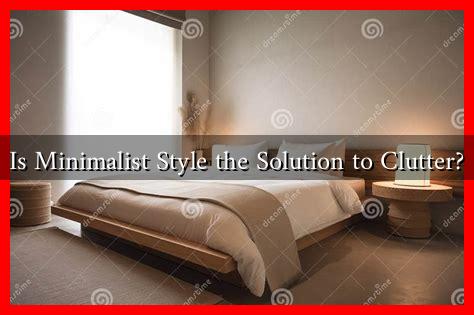-
Table of Contents
Is Minimalist Style the Solution to Clutter?
In a world where consumerism reigns and possessions seem to multiply overnight, the minimalist style has emerged as a beacon of simplicity and order. But is adopting a minimalist lifestyle truly the solution to clutter? This article delves into the principles of minimalism, its benefits, and how it can effectively combat the chaos of clutter in our lives.
Understanding Minimalism
Minimalism is more than just a design aesthetic; it is a lifestyle choice that emphasizes simplicity, intentionality, and the reduction of excess. The core philosophy revolves around the idea that less is more, encouraging individuals to focus on what truly matters. This can apply to various aspects of life, including home decor, personal belongings, and even mental space.
The Psychological Impact of Clutter
Clutter can have significant psychological effects, contributing to stress, anxiety, and a sense of overwhelm. According to a study published in the journal *Personality and Social Psychology Bulletin*, individuals living in cluttered environments reported higher levels of stress and lower levels of life satisfaction. The constant visual reminders of unfinished tasks can lead to a feeling of being trapped in one’s own space.
Benefits of Minimalist Living
Adopting a minimalist lifestyle can provide numerous benefits that extend beyond just decluttering physical spaces. Here are some key advantages:
- Reduced Stress: A minimalist environment can lead to a calmer mind, as fewer possessions mean fewer distractions.
- Increased Focus: With less clutter, individuals can concentrate better on tasks and goals.
- Financial Savings: Minimalism encourages mindful spending, leading to reduced expenses and financial freedom.
- Environmental Impact: By consuming less, minimalists contribute to sustainability and reduce waste.
Case Studies: Real-Life Examples of Minimalism
Several individuals and families have successfully embraced minimalism, showcasing its effectiveness in combating clutter:
- The Minimalists: Joshua Fields Millburn and Ryan Nicodemus, known as “The Minimalists,” have inspired millions through their blog and documentary. They advocate for living a meaningful life with less, sharing their journey of decluttering and its positive impact on their well-being.
- Marie Kondo: The author of *The Life-Changing Magic of Tidying Up* promotes the KonMari Method, which encourages individuals to keep only those items that “spark joy.” Her approach has transformed countless homes and lives, emphasizing the emotional connection to possessions.
Statistics Supporting Minimalism
Research supports the notion that minimalism can lead to a more fulfilling life. A survey conducted by the National Association of Professional Organizers found that 82% of people feel overwhelmed by clutter, while 54% reported that they would feel happier if they were more organized. These statistics highlight the widespread struggle with clutter and the potential for minimalism to provide relief.
Practical Steps to Embrace Minimalism
For those looking to adopt a minimalist lifestyle, here are some practical steps to get started:
- Assess Your Belongings: Take inventory of your possessions and identify items that no longer serve a purpose.
- Set Clear Goals: Define what minimalism means to you and establish specific goals for decluttering.
- Practice Mindful Consumption: Before making a purchase, ask yourself if the item is truly necessary.
- Establish a Routine: Regularly declutter and reassess your belongings to maintain a minimalist environment.
Conclusion
In conclusion, minimalism offers a viable solution to the pervasive issue of clutter in modern life. By embracing simplicity and intentionality, individuals can experience reduced stress, increased focus, and a greater sense of fulfillment. While minimalism may not be a one-size-fits-all solution, its principles can be adapted to fit various lifestyles and preferences. As we navigate a world filled with distractions and excess, the minimalist approach serves as a reminder that sometimes, less truly is more.
For further reading on minimalism and its benefits, consider exploring resources like The Minimalists or Marie Kondo’s official website.

